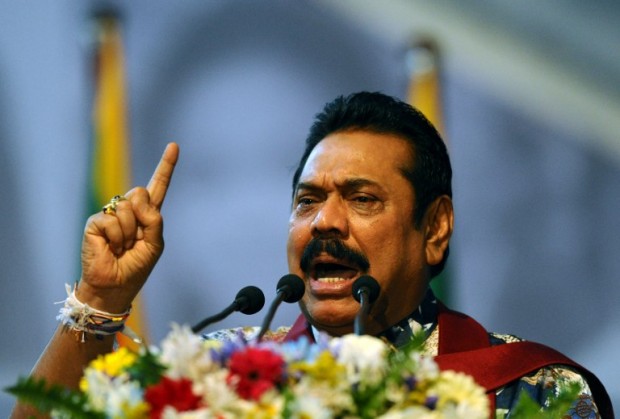
Sri Lanka President Mahinda Rajapakse addresses to supporters as he attends an election rally in the Colombo suburb of Piliyandala on January 5. AFP PHOTO
Sri Lanka’s beleaguered former leader Mahinda Rajapakse will try to pull off a shock political comeback in elections Monday that he hopes will propel him to the premiership, months after being toppled as president.
His successor as president, Maithripala Sirisena, has vowed to thwart his one-time mentor’s ambitions while many of Rajapakse’s closest relatives are facing corruption allegations, including his wife.
But the charismatic former strongman has been drawing massive crowds on the election trail across the island, looking to build unstoppable momentum in his quest for an unlikely return to power.
“I would have retired if they were doing a good job,” the 69-year-old said in one of his last addresses before Monday’s elections to the 225-seat national parliament.
“I was forced to return to politics because the government is messing things up.”
Rajapakse governed Sri Lanka for nearly a decade and was South Asia’s longest-serving ruler before his surprise defeat to Sirisena in a January 8 presidential election.
Sirisena had been the secretary general of Rajapakse’s United People’s Freedom Alliance (UPFA) as well as being health minister before he split to run for the presidency.
Rajapakse is hugely popular among big sections of the ethnic majority Sinhalese community for presiding over the crushing defeat of Tamil guerrillas in 2009 after their 37-year campaign for a separate homeland.
But he is also reviled by many Tamils who voted en masse for Sirisena in January after boycotting previous elections.
Observers say Rajapakse’s polarizing personality will undermine his chances of forming a coalition, especially as any potential prime minister would likely need the backing of minority groups.
Although there are no reliable opinion polls, no single party is expected to win a majority.
Charu Lata Hogg of the London-based Chatham House think-tank said Rajapakse’s entry into the fray has “definitely complicated the complex political scene” but said he would struggle to find allies.
“He is anathema to Tamils and Muslims as he is the personification of state terror,” Hogg told AFP.
Veto threat
Although Sirisena is now UPFA leader, his reluctant agreement to Rajapakse’s candidacy highlighted his shaky hold on the party.
Sirisena is thought to prefer outgoing premier Ranil Wickremesinghe’s United National Party (UNP) to form the next government with backing from Tamil and Muslim parties.
His recent call on voters to “protect the January 8 silent revolution” was widely interpreted as a call to vote for the UNP.
In a letter to Rajapakse on Thursday, Sirisena wrote that “even if I have to intervene to form a coalition, you will not be the prime minister”—ironically using powers Rajapakse awarded himself during his presidency.
Wickremesinghe has said Rajapakse’s decision to stand has overshadowed other more pressing issues.
“Do you want a new country and a government that thinks of your future, or do you want to go back to building up the Rajapakses and their future?” Wickremesinghe told one of his last rallies.
Opponents say Rajapakse’s main objective is to secure parliamentary immunity against possible future prosecutions.
Since his defeat in January, Rajapakse has seen his wife and two of his brothers accused of corruption. One of his sons has also been implicated in the alleged murder of a former rugby star.
“He has entered the race to protect himself,” Hogg said.
“If he is in a position of power, he can better defend himself and his family against corruption charges.”
Rajapakse was shunned by Western governments over the brutal end to the island’s ethnic conflict which prompted calls for international investigators to carry out a war crimes probe.
The UN says that some 40,000 Tamil civilians were killed in the final stages of the war, one of the bloodiest in Asia in the post-colonial era.
Rajapakse’s campaign speeches have been peppered with claims that Sirisena is “selling out” to Tamils and Muslims who together account for about a quarter of the population.
The Brussels-based International Crisis Group said in a new report that the election had major implications for post-war reconciliation efforts and a strong showing for Rajapakse would “place obstacles to further progress on much-needed governance reforms and reconciliation.”